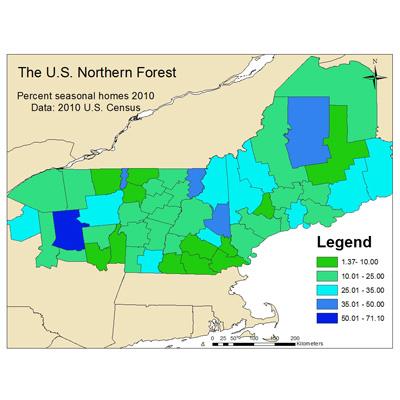Social, Economic, and Ecological Effects of Second Home Development in the Northern Forest Region

In an era of economic and ecological uncertainty, Northern Forest communities face an increasing need to effectively manage resources and make adaptive decisions. For many regions of the Northern Forest, seasonal homeownership is a key aspect of the local community economy and character, and the retirement of the baby boom generation is likely to result in future second home growth.
NSRC researchers analyzed census data to map the distribution and growth of second homes in the Northern Forest and conducted interviews and mail surveys to understand the impacts of second home ownership at community and regional-scales. They focused on a natural resource-rich region within each Northern Forest state for case study analyses: Central Adirondacks of New York, Northeast Kingdom of Vermont, Northern New Hampshire, and Bar Harbor, Maine.
They found that both seasonal and year-round residents who frequently interacted with seasonal residents perceived less tension between the resident groups. This suggests that to promote social cohesion and adaptive capacities within these communities, community development efforts should focus on activities that integrate seasonal residents with one another and with permanent residents. Women are particularly active in community-oriented events and may be appropriate candidates for building relationships among residents. Many counties in the Northern Forest experienced losses in seasonal homes between 2000 and 2010; however, researchers believe that this is in part due to conversion of seasonal to permanent housing units. As resource dependent communities transition to seasonal recreation and residence economies, they will experience changes in social dynamics, necessitating community development efforts.
